Over at The Ringer, writer Charles Holmes asks an interesting question: “What Kind of Show Is WandaVision Allowed to Be?”
In his piece, he compares the reactions from fans and critics who find WandaVision entertaining, touching, and even profound with others who believe corporate-owned comic book stories are incapable of ever being truly “good,” much less meaningful.
Ironically, this question about identity and permission is also the defining theme of the Marvel Cinematic Universe (MCU) itself.
Like every Marvel film and TV series that’s preceded it, WandaVision wrestles with these issues within the very specific, Kevin Feige-mandated constraints of what the MCU itself is “allowed” to be: always PG-13 and never too troubling.
Yet despite those boundaries, WandaVision manages to ask a question with no easy answer:
Who are we — and more specifically, who are we allowed to be?
Let’s take a closer look at WandaVision, and see how it comments on the role of “heroes” in society while also asking some important personal questions, such as: what makes someone a hero, who is allowed to be one, and how do we define ourselves to ourselves?
WARNING: SPOILERS AHEAD for all 9 episodes of WandaVision.
What Exactly IS WandaVision?
Like many of the questions within the show itself, this one has many answers.
WandaVision is the first MCU TV series to debut on Disney+.
WandaVision is the story of Wanda Maximoff (Elizabeth Olsen) and Vision (Paul Bettany).
WandaVision is a sitcom… until it’s not.
WandaVision is a mystery whose answers only generate more questions.
WandaVision is a backdoor pilot for the next Captain Marvel movie.
WandaVision is a continuation of the never-ending MCU plotline that usually runs through its episodic theatrical films, but which has now expanded to also include serialized television.
And finally — and maybe accidentally — WandaVision is a surprisingly provacative commentary on how we as individuals construct our ever-changing concept of identity.
Okay, so let’s start easy: What’s the actual story?
WandaVision’s Plot Concept, Explained
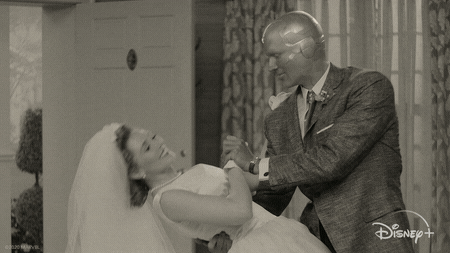
WandaVision is what happens when Wanda Maximoff, in a moment of intense grief following the traumatic events of Avengers: Infinity War and Avengers: Endgame, uses her supernatural reality-bending powers to create a new false “reality bubble” around the town of Westview, New Jersey.
Everyone inside the bubble is “recast” as a (mind-controlled) character in a joyful sitcom starring Wanda and Vision as a happy suburban couple. Wanda “broadcasts” this sitcom on a frequency which U.S. military agency S.W.O.R.D. detects and begins tracking from outside the perimeter of the impenetrable energy field which Wanda has constructed around the town.
Why is Wanda doing this?
Because American sitcoms provided her with necessary emotional escapism during the many traumatic experiences in her life — including the death of her parents, her captivity and experimentation by HYDRA agents, the death of her brother Pietro, the death of her lover Vision, and her inability to even provide Vision with a proper burial due to S.W.O.R.D. claiming his body for their own experimental military purposes.
People experiencing grief can choose to cope or lash out in different ways. In Wanda’s case, she decided to take an entire town hostage and cast them in a 24-7 feel-good fantasy where she and a recreation of her dead lover can now live happily ever after.
But unfortunately for Wanda, her escapist fantasy can’t last.
Is Wanda Maximoff a Hero or a Villain?
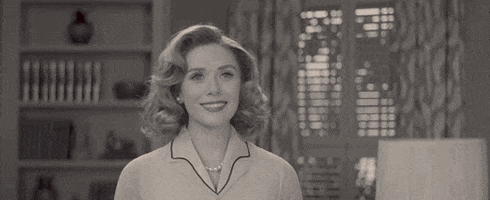
The trick of WandaVision is that she’s both.
The problem is that the series doesn’t quite wrestle with this duality on the level it demands.
First, let’s be clear: Wanda has endured possibly more heartbreak and devastation than any other “hero” in the MCU. The fact that she hasn’t completely snapped by now is a testament to her own better nature.
That said, not every choice Wanda makes is a good one, or made for a good reason.
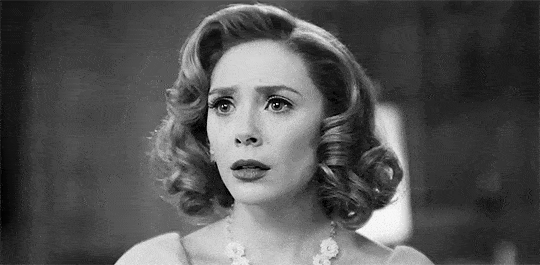
We could have a long discussion about the ethical quandaries of forcing innocent people to essentially live as slaves within your own “good” escapist narrative. But even if Wanda felt like she was making their lives better by “improving” Westview (whose citizens are shown to be economically and emotionally depressed when Wanda first observes them), she did so without their consent.
Plus, whenever one of them is momentarily freed from her mind control, their first reaction is to panic about the well-being of their family and friends outside Westview who depend on them. So not only is Wanda abusing them, but she’s also causing collateral damage by preventing them from being able to care for their children, elderly relatives, and other responsibilities.
When Wanda is finally forced to reckon with the injustice of her actions, she chooses to set the people free and allow her fantasy to disappear… except for Agatha Harkness (Kathryn Hahn), a witch who befriended Wanda in an attempt to mentor her while also trying to steal her power. Wanda leaves Agatha trapped in her WandaVision sitcom persona, allegedly so Agatha can’t hurt anyone else. (And, presumably, so Wanda can track her down for advice in some future MCU installment.)
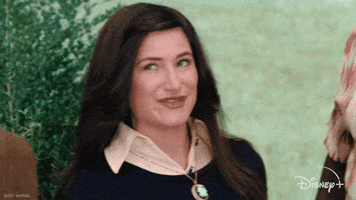
But how do the freed people of Westview feel about having Agatha’s “character” Agnes still living among them? Wouldn’t these people be doing all they can to free Agnes too, since they understand what she must be going through?
As much as WandaVision deserves the tremendous credit it gets for exploring the devastating aftermath of trauma and grief, it also fails to fully address just how much pain someone who is suffering from trauma can cause the people around them. Maybe the MCU will follow this story point to a future conclusion, but at the moment, it’s almost impossible to imagine that the general public in the MCU — and especially the people of Westview — would see Wanda as anything other than a villain.
Which brings us to a larger question:
What Determines Whether We’re Heroes or Villains?
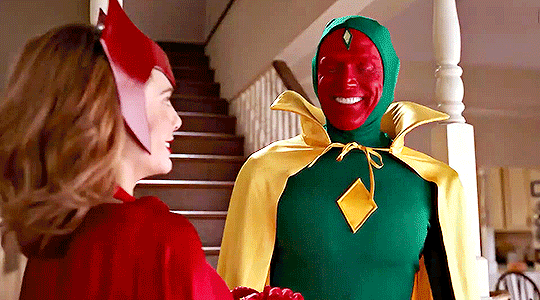
In the original Marvel comics, both Wanda (The Scarlet Witch) and her brother Pietro (Quicksilver) are introduced as villains. They battle the X-Men before eventually rejecting Magneto’s influence and choosing to become heroes instead.
Vision is also introduced as a villain, created by Ultron as a weapon to destroy the Avengers. But he has a change of heart, opposes Ultron, and is ultimately invited to join the Avengers as their peer.
In the MCU, Wanda and Pietro are initially groomed by HYDRA to fight the Avengers before they switch sides and join the Avengers to battle Ultron. Wanda’s motivation for opposing the Avengers isn’t entirely due to HYDRA’s brainwashing; as we learn in WandaVision, her parents were killed by weapons created by Tony Stark’s company, so her wanting to get revenge on Stark (Iron Man) is understandable.
Wanda doesn’t truly rise to the occasion of heroism in Avengers: Age of Ultron until Hawkeye gives her what is, for my money, one of the best speeches in the entire MCU. As he explains, being a hero isn’t about who you are; it’s about what you do.
Unfortunately, being a hero isn’t as simple as declaring yourself to be one.
That’s because there’s often a disconnect between what you do, how other people see you, and how you see yourself. And every character in the MCU wrestles with these contradictions.
When Is a Hero Not a Hero?
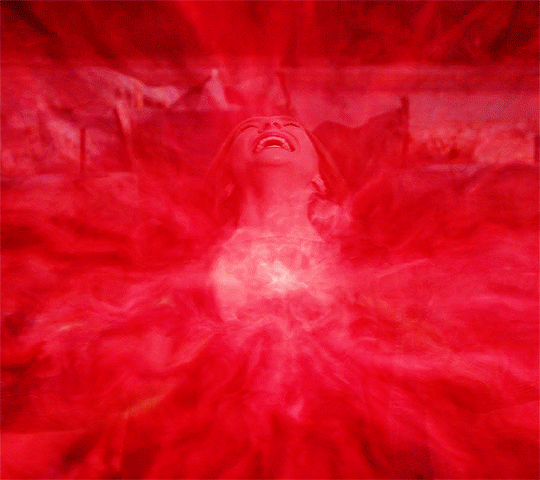
In WandaVision, Tyler Hayward at S.W.O.R.D. never misses an opportunity to paint Wanda as “the victimizer rather than the victim.” This gets Jimmy Choo in trouble for defending Wanda by suggesting there are multiple ways to evaluate her actions.
But Wanda isn’t the only MCU character whose intentions are endlessly up for debate — even in their own minds.
In Iron Man, Tony Stark is a billionaire weapons manufacturer who has a change of heart and chooses to start saving lives instead of ending them. Yet to millions of people who lost loved ones to his weapons, he’s still a villain in their eyes. And after his actions cause a catastrophe in Age of Ultron, he agrees with the U.S. government’s decision to limit the powers and freedoms of superheroes. Are these the actions of a hero?
In Captain America: The First Avenger, Steve Rogers sees himself as a patriot, but he’s too weak to even qualify for the Army during World War II until an experiment turns him into someone whose external body matches his heroic self-image. Yet despite becoming a decorated war hero, he’s ultimately forced to choose between supporting the government he’s a walking emblem of or becoming an outlaw by standing up for his own beliefs when they run counter to his government’s. Are these the actions of a hero?
Thor is a king in waiting, but he doesn’t see himself as being worthy of the throne, nor does he want the responsibility. Yet by the time Hela comes to destroy Asgard in Thor: Ragnarok, he doesn’t have much of a choice; becoming a leader is thrust upon him by default. In Infinity War, he fails to kill Thanos before half of the universe’s population is erased; in Endgame, he’s so depressed that he starts to doubt he’s even worthy of his own hammer. Are these the actions of a hero?
This notion of “worth” runs perpetually deep in the MCU — and especially in WandaVision.
Who Deserves to Be a Hero?
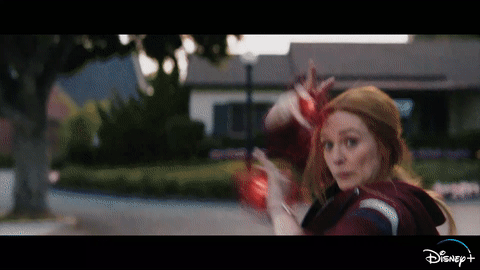
Marvel’s heroes are frequently tormented by self-doubt, even at their highest points.
In Spider-Man: Far from Home, Peter Parker believes himself to be so unworthy of Tony Stark’s newly-bestowed legacy that he gives it away to Mysterio, because he believes Mysterio is a better representation of what a hero is supposed to be. (Shortly thereafter, he’s framed by Mysterio for murder, which now casts Spider-Man as a villain in the eyes of the general public. From one moment of self-doubt comes an endless ripple effect of problems.)
Likewise, in WandaVision, Agatha Harkness calls Wanda “unworthy” of the power she possesses, and seeks to take it from her. Even Wanda herself considers her inability to fully understand and control her powers to be a weakness, and maybe even a curse.
In fact, one of the most important moments in WandaVision is an otherwise minor line of dialogue that centers on this very issue. During her “confessional” shoot, when a stressed-out and overwhelmed Wanda is trying to pretend that everything will work out fine despite her perfect sitcom life momentarily being in a total shambles, an off-camera voice asks her: “Do you think this is what you deserve?”
Wanda is shaken by this notion. She squints into the set, looking past the lights and the cameras, and says “You’re not supposed to talk.” We never see who asked her this question, but the implication is clear: Wanda’s self-doubt means she can’t allow herself to be happy, even inside a world of her own creation.
As for a happy ending, Wanda ultimately denies herself even that… sort of. She loses everything — Vision, their children, her ideal life. But in doing so, she gains some semblance of closure, which is a different kind of “happy”— and a different idea of what someone like her “deserves.”
But what exactly do we mean when we say “someone like her” — or “like” any of us?
The Ship of Theseus, Explained
Let’s talk for a moment about the pivotal scene in WandaVision‘s finale that doesn’t involve Wanda.
In the middle of the Westview library, the idyllic Vision that Wanda recreated within her fantasy is fighting to the death with a murderous new white Vision that S.W.O.R.D. created from the remains of the original.
Realizing he can’t overpower an unstoppable being who’s been programmed to destroy him, Wanda’s Vision instead decides to defeat the white Vision with existentialism.
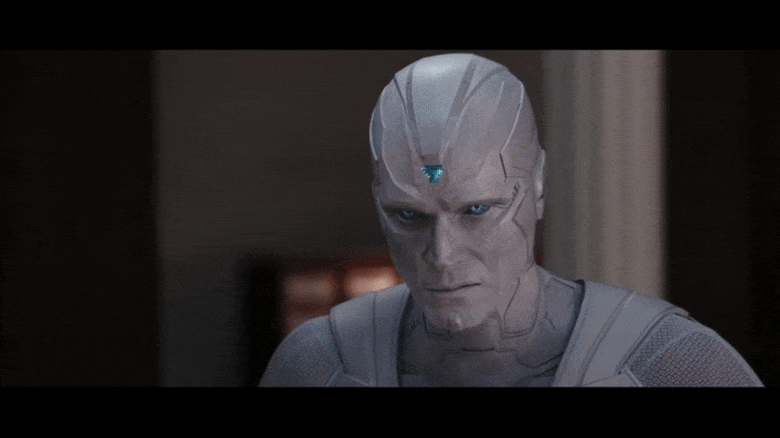
Vision poses the famous philosophical question of The Ship of Theseus: if you replace one plank of wood in Theseus’s boat, is it still his boat? Well, of course it is. But what if you replace every original piece of that boat over time? Is the fully-replaced boat still his boat? Well… functionally, yes. Legally, yes. But spiritually? If no part of the original is left, how can you truly say it’s still the Ship of Theseus?
White Vision has been programmed to kill Wanda’s Vision, but Wanda’s Vision is technically already dead; he literally doesn’t exist outside the range of Wanda’s spell over Westview. But white Vision has the original Vision’s body, and with Wanda’s Vision’s help, he unlocks the memories that S.W.O.R.D. had hidden from him. Once these memories are restored, white Vision technically *is* the original Vision again, minus the Mind Stone that was destroyed a few movies ago.
So… is white Vision now the Vision? If so… does he need to destroy himself? Or does he have free will to override his programming? (This is the kind of question that entire seasons of Westworld were built around.)
With no clear answer in sight, white Vision disengages from his murderous mission and instead flies off to contemplate what, exactly, he is.
Meanwhile, during their own showdown, Agatha warns Wanda that “the Scarlet Witch” is destined to destroy the world. But Wanda refuses to let Agatha define who she is.
Instead, Wanda ultimately leaves Westview and WandaVision behind to explore the totality of her emerging powers and try to find a way to control them. Sure, an apocalyptic prophecy may have been written about “her,” but that prophecy doesn’t mean her story is already written… does it?
Is Wanda the same person she was when WandaVision started?
Heck, are any of us the same as we were yesterday?
How Do We Define Ourselves?
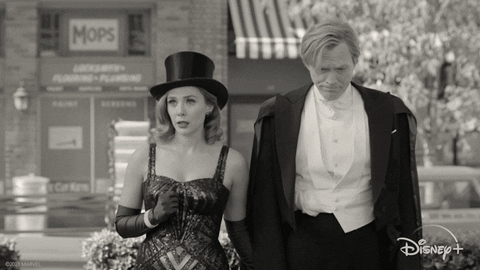
Like the Ship of Theseus — or the characters in an MCU story — who we are is forever changing.
Are we fundamentally “good” or “evil”? Is that designation permanent, or can it change over time? Do we have free will, or are we limited to a predetermined set of choices in life — or no real choices at all?
Philosophers and theologians have debated these questions for thousands of years. Yet no amount of philosophical consideration is a match for our actions in the moment.
What we do today will partially define who we are today, and who we will be tomorrow. It may even redefine who we were yesterday. But while our own self-perception may constantly change from moment to moment, others often tend to perceive us as fairly static.
To others, we are a sum of data that they draw from seeing our behaviors. The more they see of us, the more their perception of us may expand, but we are largely simplified in the eyes of the people we know. And we do this to others, too. Think of your coworkers, your family, your friends, famous people, politicians. You have a clear idea of each of them in your head — who they are, how they are, what they’re capable of — and the less you know about them, the simpler that perception tends to be.
Part of this simplification is a matter of survival: at a primitive level, we need to quickly be able to identify the “good” and “bad” people, the “friends” and the “enemies,” the ones we feel “deserve” our help and attention and others whom we feel deserve nothing at all.
Yet when we look in the mirror, what do we identify ourselves as? Heroes or villains? Deserving or undeserving? Successes or imposters?
Have we hurt others? If so, how can we make it right, and what consequences do we deserve?
Are we allowed to be works in progress? If so, who allows us to be that: others, or us?
All of which brings me back to WandaVision.
Yes, it’s a sitcom. Yes, it’s a mystery. Yes, it’s a Marvel superhero show. And yes, it’s an occasionally profound story about love and grief and family and responsibility. But for all the attention we pay to Wanda in that title, I think the real key is actually the -Vision.
WandaVision is a story about how we choose to see ourselves through an ever-changing lens of what we deserve to be, how we project an ideal version of ourselves into the world and hope that others embrace it, and how we can’t ever truly control what other people see when they look at us.
Those three channels are never going to be on the same wavelength.
In the end, our own point of view — the version of ourselves that we choose to see — is the only dial we really have control over. And it’s up to us to decide which direction we adjust our focus toward, day by day and choice by choice.
We may not always be heroes, but the end of our story hasn’t been written yet either.
If You Liked This Post, You May Also Like…
How Avengers: Endgame Succeeds on the Strength of Marvel’s Characters
Steve Harrington, Jaime Lannister, and the Secret to Writing a Redemption Arc
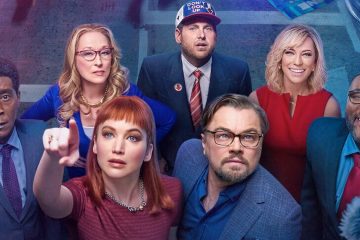

0 Comments